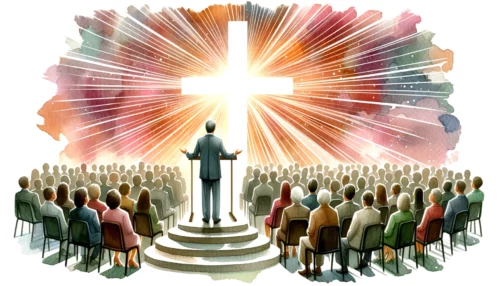We often underestimate the power of worship and its role in enhancing our connection to God. It is not just an act of religious protocol but a spiritual practice that, when embraced fully, can align us more closely with the heart of God, bolster our faith, and invigorate our spirits. In this article, we explore the importance of worship, its Biblical foundations, and practical ways to incorporate it into our daily lives for a stronger connection to our Creator.
The Biblical Importance of Worship
In understanding the significance of worship within the framework of Christianity, it’s essential to look to the Bible, our primary guide to faith and practice. The Bible speaks volumes about the importance of worship, indicating its central role in our relationship with God.
One of the most important aspects the Bible reveals about worship is that it is not merely an act, but a lifestyle. We see in the life of David, a man described as being after God’s own heart, that his relationship with God was expressed through a life of worship. David poured his heart out in praise, thanksgiving, and even in times of despair (Book of Psalms).
In the life of Jesus Christ, we also see worship as a lifestyle. Jesus modelled a life of constant communion with God, His Father, expressed through prayer, obedience, and service. His life was a perfect embodiment of what it means to worship God in spirit and truth (John 4:24).
In the New Testament, Apostle Paul urges believers to present their bodies as a living sacrifice, holy and acceptable to God, which he describes as their spiritual act of worship (Romans 12:1). This admonition suggests that our very lives, in their entirety, should be an offering to God.
The Bible also underscores the fact that God seeks those who will worship Him in spirit and truth. This implies that worship goes beyond external actions or rituals to involve the heart and soul, being sincere and genuine in our relationship with God (John 4:23).
The Book of Revelation gives us a glimpse into the heavenly realms where creatures and elders never cease to worship God day and night, proclaiming His holiness, power, and eternal nature (Revelation 4:8-11). This heavenly worship underscores the eternal significance of worship and its central role in our existence, both now and in eternity.
From these Biblical references and many more, it is clear that worship holds a central place in the life of a believer. It is not merely an act but a lifestyle, a way of relating to and honoring God that encompasses our whole being.
The Biblical perspective on worship underlines its pivotal role in our relationship with God. Worship is a lifestyle, not just an act, and it involves our whole being – spirit, soul, and body. Worship, carried out in spirit and truth, deepens our connection with God, draws us into a closer relationship with Him, and aligns us more closely with His purposes. The heavenly worship depicted in the book of Revelation also gives us a glimpse of our eternal destiny as worshippers of God. As we align our lives with this heavenly pattern, we can enhance our connection to God through a lifestyle of worship.
Different Forms of Worship
When we think about worship, we often picture singing hymns or choruses during a Sunday service. While this is indeed a form of worship, the Bible presents a much broader view of what it means to worship God.
- Singing and Making Music: This is probably the most recognized form of worship. From the songs of David in the Psalms to the hymns and spiritual songs mentioned by Apostle Paul (Ephesians 5:19), music has been a timeless means to express adoration and reverence to God.
- Prayer: Prayer is a form of worship where we communicate with God. Jesus often withdrew to pray (Luke 5:16), and Paul encourages us to pray without ceasing (1 Thessalonians 5:17).
- Reading and Meditating on God’s Word: Engaging with the Scriptures is a crucial aspect of worship. It’s through His Word that we come to know God and His will for us (2 Timothy 3:16-17).
- Living a Life of Obedience: Our obedience to God’s commands is a way of showing our love and reverence for Him, which is a form of worship (John 14:15).
- Serving Others: Jesus taught that serving others in His name is an act of worship. When we serve others, we’re serving Christ Himself (Matthew 25:40).
- Giving: Giving tithes and offerings is an act of worship, acknowledging that everything we have comes from God (2 Corinthians 9:7).
- Fasting: Fasting is an act of humility and submission to God, which is a form of worship (Matthew 6:16-18).
From this list, we see that worship is multifaceted, extending far beyond singing or music. It’s about how we live our lives in reverence to God, in the way we treat others, how we handle our resources, and how we engage with God’s Word.
These different forms of worship provide a comprehensive perspective on how worship is not just about singing or music but involves our entire life. Worshiping God encompasses a broad range of activities, including prayer, reading and meditating on Scripture, living in obedience to God’s commands, serving others, giving, and even fasting. These activities help to foster a closer relationship with God and deepen our spiritual connection with Him. By understanding and practicing these different forms of worship, we can experience a richer, more meaningful relationship with our Creator.
Incorporating Worship into Daily Life
Understanding the importance of worship and the various forms it can take is one thing. However, incorporating it into our daily life is where the transformation truly takes place. Here are a few practical ways to do just that:
- Begin and End Each Day with God: Start each morning by setting aside time for prayer and Scripture reading. This is a way to dedicate the day ahead to God. Likewise, end each day with a time of reflection and gratitude for God’s protection and provision (Psalms 5:3).
- Practice Mindfulness: Being mindful of God’s presence throughout the day helps us to stay connected to Him. This could be through short prayers, a moment of silence, or recalling a Scripture verse that speaks to you (1 Thessalonians 5:17).
- Use Music: Listen to worship music throughout the day. Whether you’re driving, working, or doing chores, music can help to keep your heart focused on God (Ephesians 5:19).
- Serve Others: Look for opportunities to serve others in your daily life. This could be as simple as helping a neighbor, volunteering in your community, or showing kindness to a stranger (Matthew 25:40).
- Give Thanks: Regularly take time to express gratitude to God for His blessings. This can be done through prayer, journaling, or sharing with others (1 Thessalonians 5:18).
- Fast Regularly: Fasting doesn’t have to be just about food. You can fast from social media, television, or anything else that distracts you from God. Regular periods of fasting can help to deepen your connection with God (Matthew 6:16-18).
Incorporating worship into daily life means living in an attitude of reverence and adoration towards God in every aspect of our lives. It involves starting and ending the day with God, practicing mindfulness of His presence, using music as a tool for worship, serving others, expressing gratitude, and fasting regularly. Each of these practices can help to enhance our connection with God, deepening our relationship with Him. As we commit to living a life of worship, we’ll find that our connection with God becomes more intimate and our spiritual lives become more vibrant.
Reflecting on the Journey
Our exploration of the power of worship and its role in enhancing our connection to God invites us to reflect on our own worship practices. Consider the following questions:
- What forms of worship am I currently practicing in my daily life?
- How can I better incorporate worship into my daily routine?
- In what ways has worship deepened my connection with God?
The power of worship is transformative. It not only strengthens our bond with our Creator but also shapes us into the people God has created us to be. As we continue on this journey, let’s commit to a lifestyle of worship. In doing so, we align our hearts with God’s heart, and we find ourselves drawn into a deeper, more intimate relationship with Him. Let the power of worship guide you closer to God, illuminating your path and enriching your spiritual journey.














